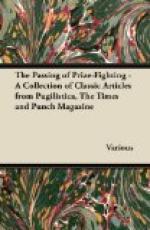It was a curious but exhilarating experience to hear the Bohemians, the playboys of Central Europe, interpreted in the roast-beef-and-plum-pudding style of the Philharmonic at its beefiest and plummiest. Dabcik survived the treatment fairly well, but poor Ploffskin was simply stodged under. But they were in the same boat with RICHARD the Elder, whose Venusberg music was given with all the orgiastic exuberance of a Temperance Band at a Sunday-School Treat, recalling the sarcastic jape of old HANS RICHTER during the rehearsal of the same work: “You play it like teetotalers—which you are not.” Yet the orchestra were lavish of violent sonority where it was not required; the well-meaning but unfortunate Mr. Orlo Jimson, who essayed the “Smithy Songs” from Siegfried, being submerged in a very Niagara of noise. WAGNER’S scoring no doubt is “a bit thick,” but then he devised a special “spelunk” (as BACON says) for his orchestra to lurk in, and there is no cavernous accommodation at the Queen’s Hall.
II.
Though fashion considers September as an unpropitious time for the production of novelties, the scheme arranged for the patrons of the Philharmonic Concert last night, under the direction of Sir Henry Peacham, was successful in bringing together an audience of eminently respectable dimensions. The occasion served for the launching under favourable circumstances of what constituted the chief landmark of the programme—a set of orchestral variations with the quaint title of “The Quangle Wangle,” from the prolific pen of Mr. Carl Walbrook. It is satisfactory to be able to record the gratifying fact that this work met with cordial acceptance. In the interests of serious art, the borrowing of a title from one of the works of a writer so addicted to levity as EDWARD LEAR may perhaps be deprecated, but there can be no doubt of the ingenuity and sprightliness with which Mr. Walbrook has addressed himself to, and accomplished, his task. If we cannot discover in his composition the manifestation of any pronounced individuality or high artistic uplift, it none the less commands the respect due to the exhibition of a vigorous mentality combined with a notable mastery of orchestral resource and mellifluous modulation. At the conclusion of the performance Mr. Walbrook was constrained to make the transit from the artistes’ room to the platform no fewer than three times before the applausive zeal of the audience could be allayed.
The remainder of the scheme was copious and well-contrived. Pleasurable evidence of the friendly interest shown in the fortunes of the Czecho-Slovakian Republic was forthcoming in the performance of two works by composers of that interesting race—Messrs. Dabcik and Ploffskin—of which it may suffice to say that the temperamental peculiarities of the Bohemian genius were elicited with conspicuous brilliancy under the inspiring direction of Sir Henry Peacham.




